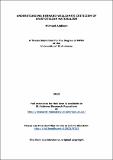Files in this item
Understanding Bernard Williams's criticism of Aristotelian naturalism
Item metadata
| dc.contributor.advisor | Hope, Simon | |
| dc.contributor.author | Addison, Michael | |
| dc.coverage.spatial | [6], 106 p. | en_US |
| dc.date.accessioned | 2016-08-16T15:16:37Z | |
| dc.date.available | 2016-08-16T15:16:37Z | |
| dc.date.issued | 2016-06 | |
| dc.identifier.uri | https://hdl.handle.net/10023/9315 | |
| dc.description.abstract | In Ethics and the Limits of Philosophy (henceforth ELP) Williams claims that holding a naturalistic Aristotelian ethical theory is no longer an option for us—we cannot believe what Aristotle believed about human beings. It is the purpose of this thesis to understand what Williams means by this claim and to evaluate whether or not it constitutes a pressing argument against Aristotelian naturalism. The modern Aristotelian (represented here by Martha Nussbaum, Philippa Foot and Rosalind Hursthouse) seems to be untouched by the claim as presented—they do not have to hold Aristotle’s view of human nature. The Aristotelian approaches human nature, not from an “outside” perspective, like the scientist, but from an “inside” perspective—from the point of view of an ethically engaged agent. The method does not seek to use a theory-independent notion of human nature to vindicate the Aristotelian claim that the properly functioning human being is virtuous. Rather, the Aristotelian is engaged in a project of using the notions of virtue that we already possess, to paint a picture of the kind of lives that we can all identify with, and endorse as properly functioning. However, there is a reading of Williams’s claim, which I draw from his replies to Nussbaum (in Mind, World and Ethics) and his essay “St Just’s Illusion”, according to which he accuses the Aristotelian, who attempts to reach human nature from the “inside”, of forgetting, that part of that reflection from the inside, will constitute a consciousness of oneself as an evolved creature. Understanding that human beings are evolved creatures, a “bricolage of powers and instincts”, should temper one’s reflection on the idea that any one life could constitute proper human functioning, as it must make us aware of the many lives that it is possible for a human being to lead. | en_US |
| dc.language.iso | en | en_US |
| dc.publisher | University of St Andrews | |
| dc.subject.lcc | BJ604.W553A3 | |
| dc.subject.lcsh | Williams, Bernard Arthur Owen | |
| dc.subject.lcsh | Naturalism | |
| dc.title | Understanding Bernard Williams's criticism of Aristotelian naturalism | en_US |
| dc.type | Thesis | en_US |
| dc.type.qualificationlevel | Doctoral | en_US |
| dc.type.qualificationname | MPhil Master of Philosophy | en_US |
| dc.publisher.institution | The University of St Andrews | en_US |
| dc.publisher.department | University of Stirling | en_US |
This item appears in the following Collection(s)
Items in the St Andrews Research Repository are protected by copyright, with all rights reserved, unless otherwise indicated.

